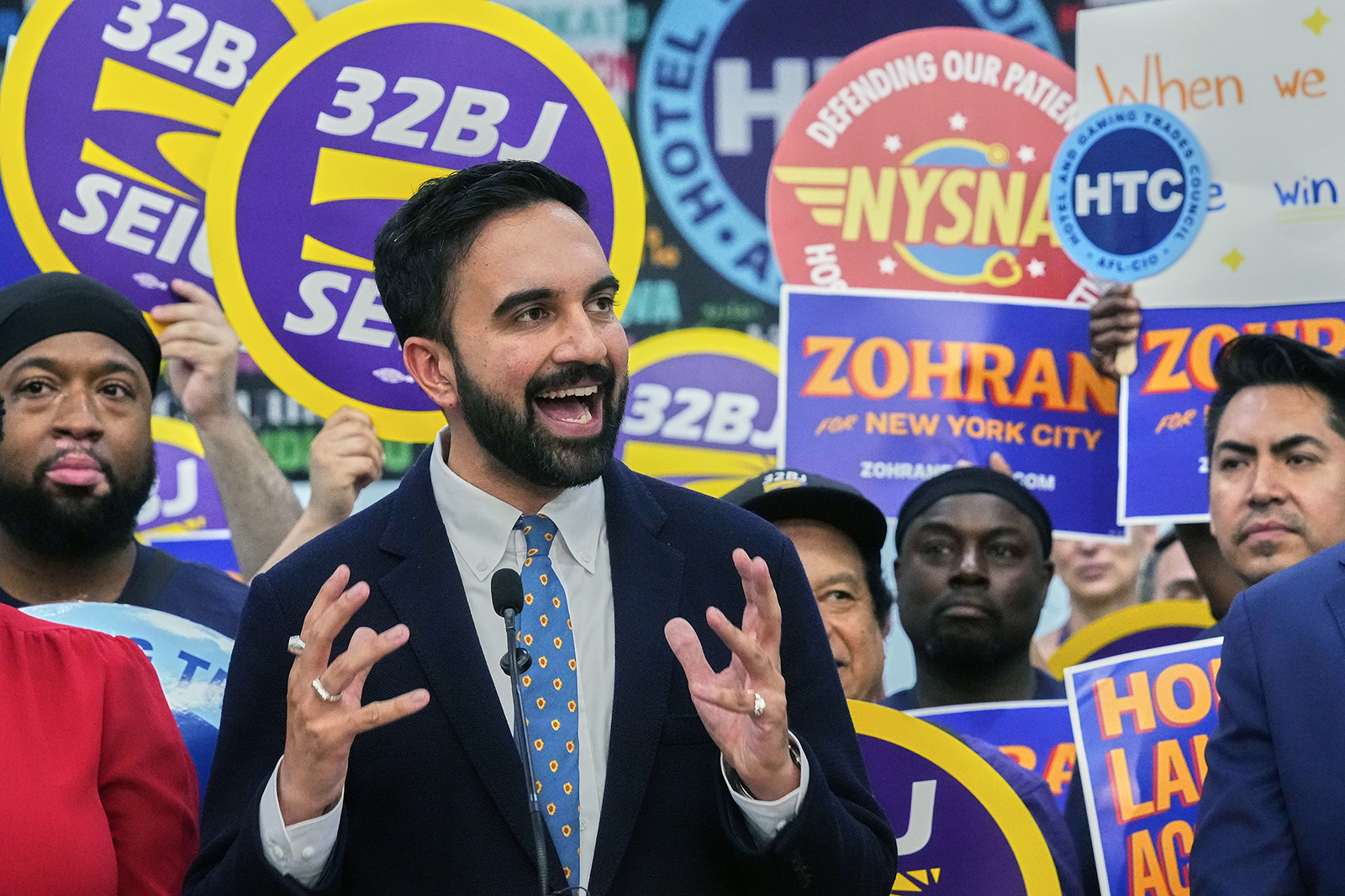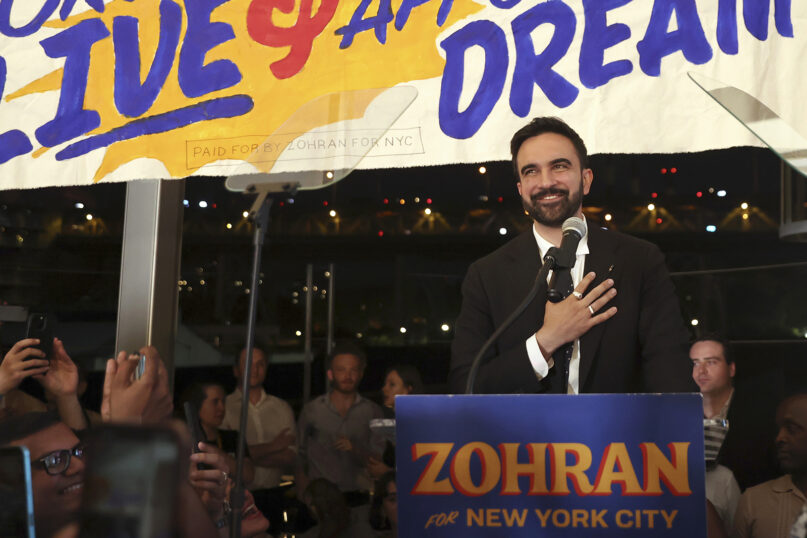
(RNS) — Zohran Mamdani’s stunning victory in New York City’s mayoral primary election felt like a watershed moment for the progressives, for his still fledgling Democratic Socialist Party and for Muslim Americans, who for the first time saw one of their own become the presumptive next mayor of the country’s largest city by comfortable margins.
All the while, Mamdani’s primary win pulled Muslims and the country even further into a xenophobic and Islamophobic familiarity reaching far past the city limits. While the Democratic primary in the deep blue city traditionally determines who will be mayor, Mamdani’s faith and socialist values promise to make the months from now until the general election in November one of the most vitriolic campaign seasons in recent history.
While some of Mamdani’s opponents are aligning with right-wing-led aggressions, the most aggressive and arguably violence-tinged attacks are coming from beyond the city. After Tennessee Rep. Andy Ogles referred to Mamdani as “little Muhammad” and urged Attorney General Pam Bondi to denaturalize and deport him, President Donald Trump entered the fray, declaring that he isn’t above investigating Mamdani to make sure he isn’t in the U.S. illegally. “I’m not going to let this Communist Lunatic destroy New York. Rest assured, I hold all the levers, and have all the cards. I’ll save New York City,” Trump declared on Truth Social.
A repeat of 9/11 has been floated as a potential threat. Laura Loomer, a far-right political activist and former candidate to represent Florida’s 21st congressional district, claimed Mamdani will be to blame for a replay of that attack on the city. On X, South Carolina Rep. Nancy Mace shared a photo of Mamdani wearing traditional shalwar-kameez, writing “After 9/11 we said ‘Never Forget.’ I think we sadly have forgotten.”
As upsetting and ugly as it has been, Mamdani’s campaign workers and supporters believe he will prevail as long as Mamdani and his team focus on their so far successful platform of making New York more affordable for everyone. That message applies uniquely to New York and may be hard to replicate outside of its five boroughs, but Mamdani’s careful use of his Muslim and South Asian identities has fundamental lessons for candidates elsewhere.
“It’s interesting how identity played a role in this campaign,” said Fahd Ahmed, executive director of DRUM Beats, a sibling of the South Asian-focused political organizing group Desis Rising Up & Moving. “It wasn’t completely sidelined, but it wasn’t the crux of politics. Zohran identified himself as being South Asian and Muslim, but it wasn’t the center of his campaign.”
Instead of urging voters to choose him because he was South Asian or Muslim, Ahmed said, Mamdani tied his identity back to an identification with New Yorkers — cab drivers, for example: “Every South Asian (in New York) has an affinity to cab drivers,” said Ahmed. “In his campaign, Mamdani asked them, ‘What do you need?’ He spent years building relationships with taxi alliances,” as the drivers’ unions are known in New York.
Similarly, Ahmed said, Mamdani asked other New Yorkers: “What does it mean to be a street vendor? What does it mean to be a food delivery worker? As a working mom, what would child care do for you? As a Muslim, how did the different forms of policing make you feel?”
Tying identity to material concerns makes it substantive, instead of it being just a representational use of identity politics. Pundits say Mamdani brought out the South Asian population, but “we’ve had dozens of South Asians run for offices,” said Ahmed. “How come most of all of them spectacularly failed?”
Asad Dandia, a New York City historian, community organizer and early supporter of the campaign, agreed, saying Mamdani’s consistent messaging is what resonated with voters. “It doesn’t matter your religion, it doesn’t matter your ethnicity, it doesn’t matter your social outlook — everyone has to buy groceries. Everyone has to pay bills. That was much more powerful than (Mamdani rival Andrew) Cuomo’s message,” Dandia said.
National Democrats are taking note of Mamdani’s success. There is much that can translates to other races, including a relentless, on-the-ground campaigning and a fun and powerful social media presentation. The real lessons, however, are about staying close to the voters. As Ahmed said, “People who are organized, mass-based organizations that are well connected to their communities, that know what networks to call upon — that applies anywhere.”
Complicating Mamdani’s route to the mayor’s office is his stance on Gaza. There is no doubt that he captured the hearts and minds of progressives and Muslims especially because they had grown frustrated with Democratic Party, which had alienated the Muslim vote with its support for Israel in the Gaza war.

Democratic mayoral candidate Zohran Mamdani takes the stage at his primary election party, June 25, 2025, in New York. (AP Photo/Heather Khalifa)
Mamdani’s ability to win while standing up for Gaza in a city that is arguably the center of American Jewish life is nothing short of remarkable and telling. No matter how hard Mamdani worked to center his campaign on making the city more affordable, Gaza was brought up at every turn, as Mamdani’s Democratic establishment opponents hoped to paint him as an antisemite.
But as New York Magazine reported in a recent cover story on Mamdani, “voters in the city with the most Jews outside Tel Aviv simply did not buy the notion that Mamdani is an antisemite who would discriminate against or fail to protect them.”
New York City Councilwoman Shahana Hanif, the first Muslim woman elected to the New York City Council, also held onto her seat in a primary campaign that also largely focused on Israel’s bombing campaign in Gaza. Dandia explained that New Yorkers are at the same time “opening up their phones and seeing the horrible images coming out” of Gaza and “are really weirded out that this foreign policy is being brought into a city election.”
Haris Tarin, vice president of policy and programming at the Muslim Public Affairs Council, wrote on social media: “This is not about religion. Jews and Muslims both are diverse and make America a beautiful place. This is about a foreign lobby trying to make any critique of Israel a local city issue.”
Nonetheless, many Mamdani supporters and volunteers are concerned that Islamophobic attacks will stir up hate and violence. Ahmed said, “The implications for Zohran on a personal level and for our communities at large are extremely worrisome.”
We’ve already seen how political violence can manifest in the worst of ways, as with the murder of a Minnesota state legislator and the shooting of her spouse and another legislator and his spouse last month. Hate is one of the easiest commodities to peddle, and one doesn’t have to be Muslim, Democratic or even a progressive or socialist to be worried.
(Dilshad D. Ali is a freelance journalist. The views expressed in this commentary do not necessarily reflect those of RNS.)
